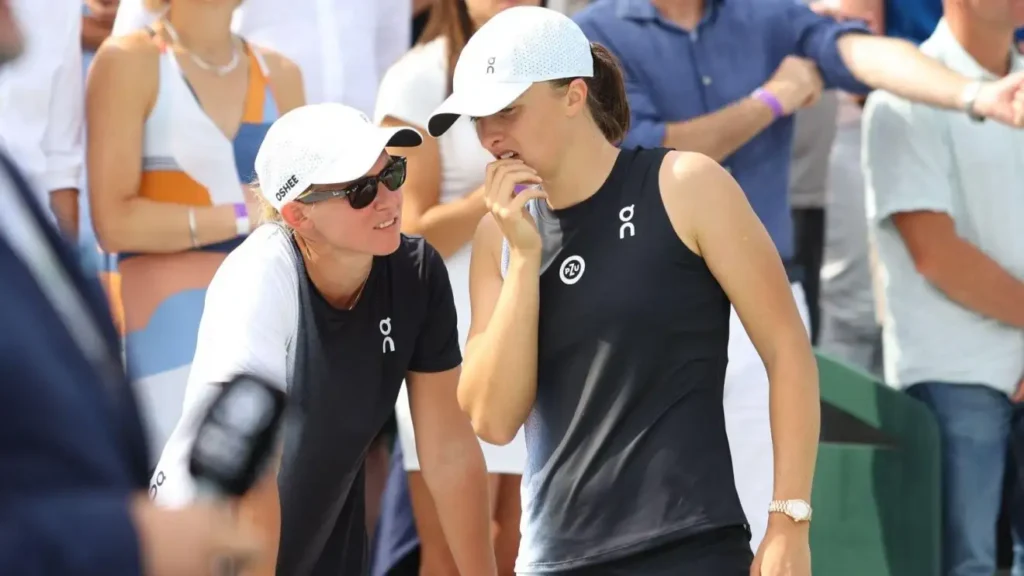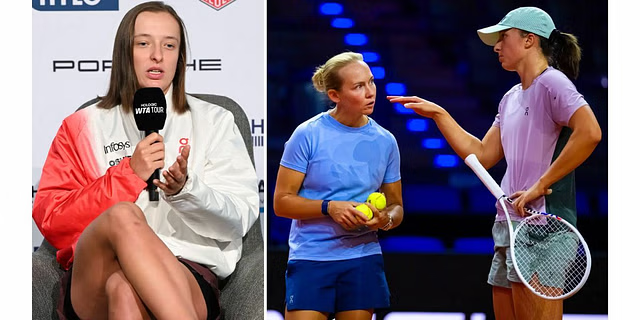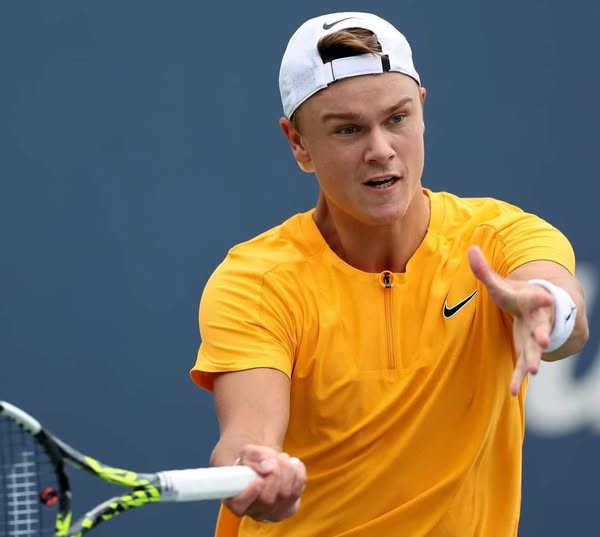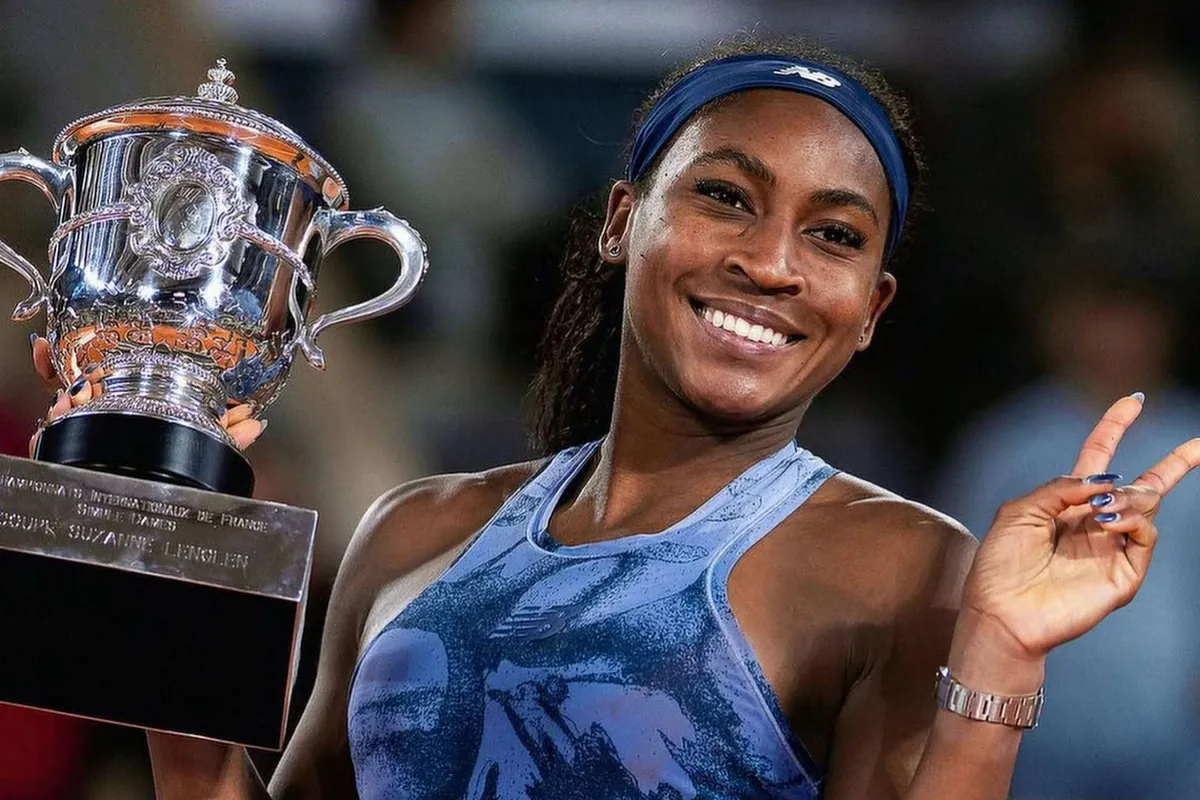Iga Swiatek, the 2023 French Open champion and one of the brightest stars on the WTA circuit, has been an unwavering force on the tennis court. But while her stellar performances continue to earn her accolades, off-court matters have recently captured public attention. Most notably, the subject of her working relationship with psychologist Daria Abramowicz has become a hot topic. With Swiatek’s rise to the top came an influx of scrutiny, and it didn’t take long for some critics to focus their attention on the bond she shares with Daria. What followed was an overwhelming wave of harsh criticism, misleading rumors, and false narratives. Yet, as always, Swiatek’s response to these attacks demonstrated not only her resilience but also her commitment to shutting down harmful misinformation.
The Growing Criticism and the Impact on Swiatek’s Reputation
In the hyper-competitive world of professional tennis, where every aspect of an athlete’s life is dissected by the media and fans alike, Iga Swiatek’s relationship with her psychologist Daria has often been an area of fascination. Their collaboration has been widely praised as one of the key factors behind Swiatek’s mental fortitude and success, especially during her meteoric rise. However, as with many high-profile relationships, this one too became a target for critics.
The criticisms began to surface after Swiatek’s surprising exit from the 2024 Australian Open. Despite her dominance on the WTA tour, some detractors started to question whether her psychologist was truly a positive influence. Speculations ran wild, with people questioning Daria’s methods and even insinuating that her approach was somehow hindering Swiatek’s mental game. The media, always eager for a scandal, fueled these theories, and soon a toxic narrative emerged that cast doubt on both Swiatek’s and Daria’s professional relationship.

Swiatek’s Response: A Firm Stand Against False Theories
Rather than letting the criticism fester, Swiatek chose to address the issue head-on. In an impassioned statement, she broke her silence on the matter, making it clear that she would not allow her bond with Daria to be tainted by baseless rumors. The Polish tennis star emphasized that her relationship with Daria was one built on trust, respect, and shared values—key components that had helped her navigate the pressures of being at the top of women’s tennis.
“I know Daria, and I know the work we’ve done together,” Swiatek said in her statement. “I’ve been working with her since I was a teenager, and she’s played a crucial role in helping me grow as a person and a player. This is the reality, not the stories people are trying to sell.”
Swiatek went on to directly confront the “false theories” that had been circulating. She firmly rejected the idea that Daria’s methods were damaging or that the psychologist had somehow been a negative influence on her career. “The theories being spread about Daria’s impact are not only misleading, but they are also disrespectful to both of us. It’s disappointing, but I won’t let these false ideas define our work together,” Swiatek added, sending a strong message to those who had tried to tarnish her image.
The reaction from Swiatek was not just an attempt to defend Daria, but also an affirmation of her own commitment to mental health and well-being. Swiatek has often spoken about the importance of mental strength in tennis and how having the right psychological support has been crucial to her success. By publicly standing by Daria, she reaffirmed that her mental game was a priority and that any attack on that front would be met with clarity and resolve.
The Importance of Psychological Support in Tennis
Swiatek’s statement also provided insight into the critical role that psychological support plays in elite sports. Mental health has become an increasingly important topic in tennis, with many players acknowledging the pressures of performing at the highest level. Swiatek, who has openly discussed her mental health journey, made it clear that working with Daria had been vital to her success and emotional well-being.
In tennis, where the physical demands are intense and the mental pressure can be overwhelming, a psychologist like Daria helps players like Swiatek navigate the ups and downs of their careers. From dealing with defeat to handling the weight of expectations, the psychological aspect of tennis is just as important as physical conditioning. Swiatek’s success on the court is as much a testament to her mental fortitude as it is to her physical prowess.
“I’ve learned that you need to take care of your mental health just as much as your physical health,” Swiatek shared. “Daria helps me focus, stay grounded, and approach each challenge with a clear mind. Our work together is about more than just winning matches—it’s about making sure I’m the best version of myself.”
Swiatek’s decision to open up about her psychological support was a refreshing reminder that behind the powerful serves and incredible rallies, athletes are human beings with emotions, vulnerabilities, and complex needs. The stigma surrounding mental health in sports is slowly fading, and Swiatek’s decision to publicly defend her psychologist is a step in the right direction for the entire athletic community.
Social Media Backlash and Support for Swiatek
While some fans and pundits took to social media to continue their criticism, Swiatek’s candid response garnered overwhelming support from her followers. Fans flooded her social media channels with messages of encouragement, applauding her for standing up for her values and for her commitment to the truth.
One Twitter user wrote, “Iga, you’ve always been an inspiration. Standing up for your team and defending what’s right takes courage. You’ve got our support!”
Another fan added, “I’m so proud of Iga for handling this with such grace and strength. The world needs more athletes who value their mental health and the people who help them achieve greatness!”
These messages flooded in from all corners of the tennis world, reinforcing the notion that Iga Swiatek is not just a champion on the court but also a role model off it. It was clear that her transparency and refusal to entertain false rumors only strengthened her fan base and made her an even more respected figure.
The Bigger Picture: Mental Health in Sports
Swiatek’s defense of Daria also sheds light on a larger issue in professional sports—the need for more open discussions surrounding mental health and the importance of having the right support system. Athletes are often expected to be invincible, but the reality is that they face intense psychological strain. High expectations, media scrutiny, and the pressure to constantly perform can take a toll on mental well-being.
Swiatek’s willingness to openly support her psychologist, and to defend the partnership they have built, is a reminder that mental health should be a priority for athletes at all levels. The decision to work with a psychologist is no longer seen as a sign of weakness, but rather as a tool for growth and success. In many ways, Swiatek has become a leader in normalizing the importance of psychological support in sports.
By confronting the rumors head-on and continuing to champion the role of mental health in her career, Swiatek has not only cleared her name but also set a precedent for other athletes to follow. Her ability to shut down false narratives while reinforcing the truth shows maturity beyond her years and a deep understanding of what it takes to succeed at the highest level.

Conclusion: Iga Swiatek’s Legacy Beyond Tennis
As Iga Swiatek continues to dominate on the tennis court, her actions off the court are equally noteworthy. Her defense of her psychologist Daria Abramowicz highlights the strength of their professional relationship and the importance of mental health in sports. Swiatek’s firm response to the false rumors surrounding her psychologist showcases her unwavering commitment to the truth, her team, and her own well-being.
Iga Swiatek’s legacy will undoubtedly extend far beyond her impressive tennis achievements. Her ability to balance her mental health with the demands of professional sport, and to be vocal about the support she receives, sets an example for athletes everywhere. In shutting down false theories, Swiatek has not only defended her career but has also become an advocate for mental health, proving that strength comes in many forms.
In the ever-evolving world of professional tennis, Swiatek’s courage to stand firm in the face of criticism reinforces that she is more than just a champion—she is a trailblazer.


